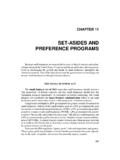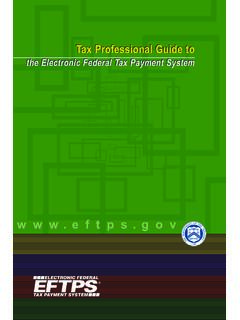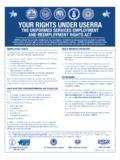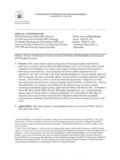Transcription of Federal Farm Promotion ('Check-Off') Programs
1 1 This report focuses on free-standing generic Promotion Programs ; it generally does not coverthe similar Promotion activities which are part of the regulations dictated by marketing ordersauthorized by the Agricultural Marketing Agreement Act of 1937 as amended. For greater detailon all of these Programs , see the USDA-AMS website at [ ].Order Code 95-353 Updated October 20, 2008 Federal farm Promotion ( check -Off )ProgramsGeoffrey S. BeckerSpecialist in Agricultural PolicyResources, Science, and Industry DivisionSummaryThe Supreme Court in 2005 affirmed the constitutionality of the so-called beefcheck-off program, one of the 18 generic Promotion Programs for agricultural productsthat are now active nationally.
2 Supporters view check -offs as economically beneficialself-help activities that need minimal government involvement or taxpayer , handlers, and/or importers are required to pay an assessment, usuallydeducted from revenue at time of sale thus the name check -off. However, somefarmers contend they are being taxed for advertising and related activities they wouldnot underwrite voluntarily. The Supreme Court s decision to uphold the beef check -offis considered significant for the future of the other Programs , although the Court leftopen the possibility of additional Programs , particularly at the state and regional levels, have existed formany decades.
3 Interest in more federally mandated Programs has increased over the pastseveral decades, as commodity groups have sought new ways to support their groups view the Programs as economically beneficial farmer self-help activitiesrequiring minimal Federal funding. USDA s Agricultural Marketing Service (AMS) hassome administrative and oversight responsibilities, but the producer-contributor boardsthat run the Programs must reimburse AMS for such Congressionally authorized Programs now collect assessments for 18 commodities(with the year they began, and collections for the most recent year reported): beef (1986;$ million), blueberries (2000; $ million), cotton (1966; $ million), dairyproducts (1984; $ million), eggs (1976; $21 million), fluid milk (1993; $ ), Hass avocados (2002; $ million), honey (1987.)
4 $ million), lamb (2002;$ million), mangos (2005; $ million estimated), mushrooms (1993; $ million),CRS-22 Source: AMS, unpublished spreadsheet. The beef, dairy, pork, and soybean Programs transfera portion of these total collections for state-level Armbruster, Walter J., and John P. Nichols. Commodity Promotion Policy. 1995 farm BillPolicy Options and Consequences, Texas A&M University, October (1999; $ million), popcorn (1997; $600,000), pork (1986; $ million),potatoes (1972; $ million), sorghum (2008; $12-$16 million projected), soybeans(1991; $ million), and watermelons (1990; $ million).
5 Among other check -offsthat have been authorized but either not yet implemented, or terminated by producers inreferenda, are canola and rapeseed, wheat, flowers, kiwifruit, limes, and Title V of the Federal Agricultural Improvement and Reform Act of 1996 ( 104-127) gave USDA broad-based authority to establish national generic Promotion andresearch Programs for virtually any commodity, either at its own initiative or upon therequest of an industry group, without waiting for specific legislative authority. Prior tothe 1996 law, a check -off necessitated passage of specific authority for an individualcommodity a route that some producer groups still follow.
6 For example, the HassAvocado Promotion , Research, and Information Act of 2000, signed into law on October23, 2000, explicitly authorized the program that took effect September 9, billions of dollars are spent annually on branded food advertising andpromotion, where one producer pits its name brand against the names of others offeringa similar or substitute product. Perdue chicken and Tropicana orange juice commercialsare examples of branded advertising. Generic ads, on the other hand, have no connectionto the name of a specific producer. Because producers of a basic agricultural productcannot easily convince consumers to choose a particular egg or potato over another,generic advertising can help to expand total demand for the product, it is advertising uses television, radio, and other media to reach consumers.
7 TheBeef: It s What s for Dinner and Pork: The Other White Meat ads have been Programs also seek to expand foreign markets and to fund research and education,such as development of new or improved products or surveys of consumer behavior.(Such activities are generally directed by the producer boards and approved by AMS.)Producers can and have organized voluntary check -offs, but they account for onlya small share of all funding for generic efforts. Since the prototype Florida CitrusAdvertising Tax was instituted in 1935, hundreds of mandatory farm commoditypromotion Programs have been legislated by states or the Federal government.
8 Nine outof ten farmers were contributing to one or more of these efforts by the commodity groups prefer mandatory check -offs as a way to address the so-called free rider problem nonpaying producers who benefit economically fromprograms that others have funded. Requests to Congress or USDA to authorizemandatory check -offs have been prompted by various factors, including the search fornew ways to stimulate product demand, particularly as farm markets have globalized producers face more foreign competition domestically and Glickman v. Wileman Bros.
9 & Elliot, Inc. 521 457, 477 (1997).5 United States v. United Foods, Inc. 533 405, 412 (2001). After the Court s decision, theMushroom Council, the producer board that administers the program, in 2001 reduced themandatory assessments and diverted their revenue to non-promotional activities such as researchinto mushrooms health and nutritional ChallengesSome producers have vigorously challenged mandatory check -off Programs . Somehave asked USDA to change or abolish orders it has issued on behalf of the commodityboards, or petitioned the department to hold a producer referendum on whether a check -off should continue.
10 Some producers also have filed lawsuits in Federal courts. Their keycontention has been that the check -off is a tax to fund advertising and other activitiesthey would not pay for voluntarily. Three cases have reached the Supreme the first, Glickman v. Wileman Brothers and Elliot, Inc., California peach andnectarine handlers had challenged the USDA marketing order, which is not only apromotion program but also sets quality standards and other marketing rules for thosefruits (see footnote 1). The 9th Circuit Court of Appeals had held that the order mandatingthe assessments violated the affected parties First Amendment rights and therefore wasunconstitutional.



